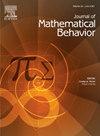整数和分数知识的重组:道尔顿和安吉拉--两名三年级数学强化辅导儿童的案例
IF 1
Q3 EDUCATION & EDUCATIONAL RESEARCH
引用次数: 0
摘要
2 结果表明,这两名患有综合症的儿童通过有意义的活动发展了分数知识,这些活动涉及他们的整数方案和基本分数知识;参与者利用他们的数列、双倍的使用、分割操作和迭代操作来构建分数任务的解决方案。对于患有智力障碍的儿童如何在较长的时间跨度内使用和发展细微形式的迭代和分割来学习整数和分数知识,以及这些发展形式如何暗示不同形式的参与性和预测性推理阶段,这些问题仍然存在。本文章由计算机程序翻译,如有差异,请以英文原文为准。
Whole number and fraction reorganization of knowledge: A case of Dalton and Angela, two third grade children with intensive supports in mathematics
We examined how whole number knowledge and fraction knowledge may interact, conducting task-based interviews with two third-grade children with ISM.2 Results indicate that these two children with ISM developed fraction knowledge through meaningful activity involving their whole number schemes and their rudimentary fraction knowledge; the participants leveraged their number sequences, use of doubles, partitioning operations, and iterating operations to construct fraction task solutions. Questions remain regarding how children with ISM may use and develop nuanced forms of iteration and partitioning for both their whole number and fraction learning over longer spans of time and how these forms of development may suggest varying forms of participatory and anticipatory stages of reasoning.
求助全文
通过发布文献求助,成功后即可免费获取论文全文。
去求助
来源期刊

Journal of Mathematical Behavior
EDUCATION & EDUCATIONAL RESEARCH-
CiteScore
2.70
自引率
17.60%
发文量
69
期刊介绍:
The Journal of Mathematical Behavior solicits original research on the learning and teaching of mathematics. We are interested especially in basic research, research that aims to clarify, in detail and depth, how mathematical ideas develop in learners. Over three decades, our experience confirms a founding premise of this journal: that mathematical thinking, hence mathematics learning as a social enterprise, is special. It is special because mathematics is special, both logically and psychologically. Logically, through the way that mathematical ideas and methods have been built, refined and organized for centuries across a range of cultures; and psychologically, through the variety of ways people today, in many walks of life, make sense of mathematics, develop it, make it their own.
 求助内容:
求助内容: 应助结果提醒方式:
应助结果提醒方式:


